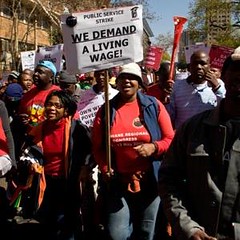
A South African strike by public sector in employees has had a dramatic impact on the country. The workers are demanding a 8.4 percent raise as well as a housing allowance.
Originally uploaded by Pan-African News Wire File Photos
00:31 Mecca time, 21:31 GMT
S Africa hospitals get army help
Haru Mutasa reports on thousands of South African troops deployed to help strike-hit hospitals.
The South African government has sent soldiers to assist in hospitals after striking workers defied a court order to return to work, pushing the public sector strike to its six day.
Almost three thousand soldiers were deployed on Monday to 37 hospitals across the country to help keep basic health services running and prevent the public sector from falling into further chaos.
Haru Mutasa, Al Jazeera's correspondent in Johannesburg, said that calling in the army was "a short term measure to try and keep public institutions going, and to protect a handful of doctors and nurses who showed up to work.
"Government officials and strikers are miles apart. Neither side seems willing to compromise and this is now the second week of a nationwide public sector strike."
Nomvula Mokonyane, a government official said that the South African government had little choice but to call in the army.
"It will be a sad day if we find our health institutions becoming military bases.
"But the calling in of the army and police is again in the best interests of our people, and to safeguard those who availed themselves to work."
More than a million public sectors embarked on a strike last Wednesday demanding an 8.6 per cent wage increase and a 1,000-rand (137-dollar, 108-euro) housing allowance.
The government is offering a seven per cent raise and a 700-rand housing allowance.
The court order won by government on Saturday, ordered thousands of health care workers and others deemed as providing essential services to return to their jobs in a bid to reduce the blow of a walkout that has shut schools and caused chaos at hospitals.
It also prevents the striking workers from assaulting colleagues who report to work and intimidating members of the public who are seeking services.
Two groups of strikers in Durban defied the order on Monday, with workers blocking an entrance at King Edward Hospital and police firing rubber bullets to clear the entrance to Addington Hospital, according to the South African Press Association news agency.
Police at Johannesburg hospitals were guarding entrances during peaceful protests, while in Cape Town health officials said only a handful of hospital workers were off the job.
Strike to continue
A spokesman for a health workers' union said its members would stay off work while other essential public sector employees who were ordered to return to work were also expected to extend their walkout.
"There is no one who is expected to be going back to work today. We will challenge that court order if its intention is to intimidate our members into submission," Sizwe Pamla, a spokesman for healthcare workers' union NEHAWU, told Reuters news agency.
Government says that meeting the unions' wage demands would require cuts in other services, amid fierce public pressure for greater access to housing, water and electricity.
The African National Congress government is under pressure to reach a deal in order to appease its long-standing ally of organised labour, while unions are facing pressure to reach an agreement from rank and file members losing pay for being off the job.
The image of the unions has taken a blow, with the health minister calling strikers "murderers" for abandoning care of the sick.
But Pamla told Al Jazeera that it was unacceptable to use "some of the things happening to blackmail workers".
"The workers demands are legitimate and fair. It is government's responsibility to get on board and start acting like leaders."
The strike is likely to stretch through this week, but analysts expect a deal to be met before September, which would minimise the impact of the strike in Africa's largest economy.
The stoppage involves a coalition of more than a dozen unions who represent 1.3 million state employees including teachers, police, nurses, customs officials and office workers.
Unions representing municipal workers and other groups have threatened to launch 'sympathy strikes' from Thursday, a move that would further increase pressure on the government to reach a deal.
No new talks between the unions and government have been scheduled to date.
No comments:
Post a Comment